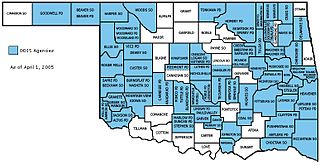
The Federal Bureau of Investigation (FBI) is the domestic intelligence and security service of the United States and its principal federal law enforcement agency. Operating under the jurisdiction of the United States Department of Justice, the FBI is also a member of the U.S. Intelligence Community and reports to both the Attorney General and the Director of National Intelligence. A leading U.S. counterterrorism, counterintelligence, and criminal investigative organization, the FBI has jurisdiction over violations of more than 200 categories of federal crimes.
The Uniform Crime Reporting (UCR) program compiles official data on crime in the United States, published by the Federal Bureau of Investigation (FBI). UCR is "a nationwide, cooperative statistical effort of nearly 18,000 city, university and college, county, state, tribal, and federal law enforcement agencies voluntarily reporting data on crimes brought to their attention".
The National Institute of Justice (NIJ) is the research, development and evaluation agency of the United States Department of Justice. NIJ, along with the Bureau of Justice Statistics (BJS), Bureau of Justice Assistance (BJA), Office of Juvenile Justice and Delinquency Prevention (OJJDP), Office for Victims of Crime (OVC), and other program offices, comprise the Office of Justice Programs (OJP) branch of the Department of Justice.

The Federal Bureau of Prisons (BOP) is a United States federal law enforcement agency under the Department of Justice that is responsible for the care, custody, and control of incarcerated individuals who have committed federal crimes; that is, violations of the United States Code.

The Office of Justice Programs (OJP) is an agency of the United States Department of Justice that focuses on crime prevention through research and development, assistance to state, local, and tribal criminal justice agencies, including law enforcement, corrections, and juvenile justice through grants and assistance to crime victims.
The Research and Innovative Technology Administration (RITA) is a unit of the United States Department of Transportation (USDOT). It was created in 2005 to advance transportation science, technology, and analysis, as well as improve the coordination of transportation research within the department and throughout the transportation community.
Michael D. Maltz is an American electrical engineer, criminologist and Emeritus Professor at University of Illinois at Chicago in criminal justice, and adjunct professor and researcher at Ohio State University.

The government of the U.S. State of Oklahoma, established by the Oklahoma Constitution, is a republican democracy modeled after the federal government of the United States. The state government has three branches: the executive, legislative, and judicial. Through a system of separation of powers or "checks and balances," each of these branches has some authority to act on its own, some authority to regulate the other two branches, and has some of its own authority, in turn, regulated by the other branches.

The Bureau of Justice Statistics (UJC) of the U.S. Department of Justice is the principal federal agency responsible for measuring crime, criminal victimization, criminal offenders, victims of crime, correlates of crime, and the operation of criminal and civil justice systems at the federal, state, tribal, and local levels. Established on December 27, 1979, BJS collects, analyzes, and publishes data relating to crime in the United States. The agency publishes data regarding statistics gathered from the roughly fifty-thousand agencies, offices, courts, and institutions that together comprise the U.S. justice system.

The Oklahoma State Bureau of Investigation (OSBI) is an independent state law enforcement agency of the government of Oklahoma. The OSBI assists the county sheriff offices and city police departments of the state, and is the primary investigative agency of the state government. OSBI works independent of the Oklahoma Department of Public Safety to investigate criminal law violations within the state at the request of statutory authorized requesters. The OSBI was created in 1925 during the term of Governor Martin E. Trapp.

The Federal Transfer Center (FTC Oklahoma City) is a United States federal prison for male and female inmates in Oklahoma City, Oklahoma. It is operated by the Federal Bureau of Prisons, a division of the United States Department of Justice, and houses offenders and parole violators who have yet to be assigned to a permanent prison facility. Most inmates who enter the federal prison system come through the facility.

Justice Research and Statistics Association (JRSA) is a national nonprofit organization of state Statistical Analysis Centers, researchers, and practitioners throughout government, academia, and justice organizations. Justice Research and Statistics Association's members form a network of justice professionals dedicated to policy-relevant research and practice. The association was created in 1974 to promote cooperation and the exchange of criminal justice information among the states. JRSA is a 501(c)(3) nonprofit organization.
Statistical Analysis Centers (SACs) are state agencies created by legislation or Executive Order that collect, analyze, and disseminate criminal and juvenile justice data. They contribute to effective state policies through statistical services, research, evaluation, and policy analysis.

The Florida Department of Law Enforcement (FDLE) is a state-wide investigative law enforcement agency within the state of Florida. The department formally coordinates eight boards, councils, and commissions. FDLE's duties, responsibilities, and procedures are mandated through Chapter 943, Florida Statutes, and Chapter 11, Florida Administrative Code. FDLE is headed by a commissioner who reports to the Florida Cabinet, which is composed of the governor, the attorney general, the chief financial officer, and the commissioner of agriculture. The commissioner is appointed to his position by the governor and cabinet and confirmed by the Florida Senate.

The California Department of Justice is a statewide investigative law enforcement agency and legal department of the California executive branch under the elected leadership of the California Attorney General (AG) which carries out complex criminal and civil investigations, prosecutions, and other legal services throughout the US state of California. The department is equivalent to the State Bureau of Investigation in other states.
The Oklahoma Sentencing Commission was an independent agency of the government of Oklahoma. Now defunct, the Commission was established to maintain an effective, fair, and efficient sentencing system for the state of Oklahoma. The 17-member commission was also charged with enhancing public safety, providing truth-in-sentencing and unwarranted disparity in the sentencing of individuals convicted in the state's criminal justice system.
The U.S. Bomb Data Center serves as a nationwide collection center for information regarding arson and explosives related events throughout the United States. The Center was established in 1996 as a result of a congressional mandate and utilizes information from various government organizations such as the Bureau of Alcohol, Tobacco, Firearms and Explosives; the Federal Bureau of Investigation; and the United States Fire Administration.

ODIS, or the Offender Data Information System is a web based, computerized records management software application to improve the capture, maintenance and quality of law enforcement data that is capable of running in any combination of centralized or decentralized network environments. It is designed using Microsoft's DNA programming model, constructed using three tiers: database for storage, compiled application components to handle the business logic and the presentation layer which is what the user sees.

ICPSR, the Inter-university Consortium for Political and Social Research, was established in 1962. An integral part of the infrastructure of social science research, ICPSR maintains and provides access to a vast archive of social science data for research and instruction. Since 1963, ICPSR has offered training in quantitative methods to facilitate effective data use. The ICPSR Summer Program in Quantitative Methods of Social Research offers a comprehensive curriculum in research design, statistics, data analysis, and methodology. To ensure that data resources are available to future generations of scholars, ICPSR curates and preserves data, migrating them to new storage media and file formats as changes in technology warrant. In addition, ICPSR provides user support to assist researchers in identifying relevant data for analysis and in conducting their research projects.












